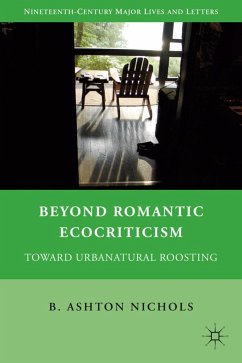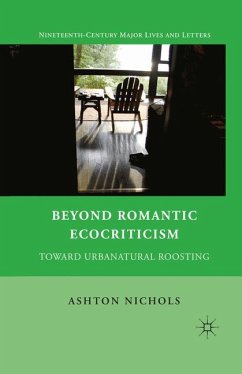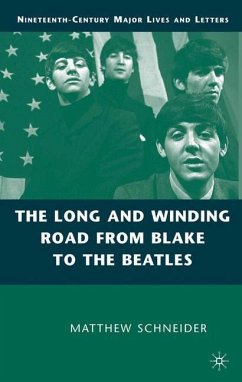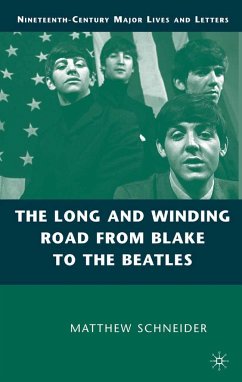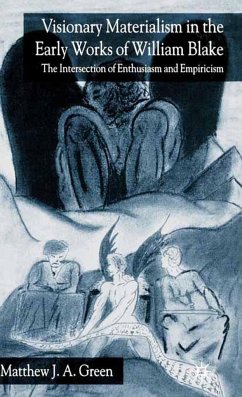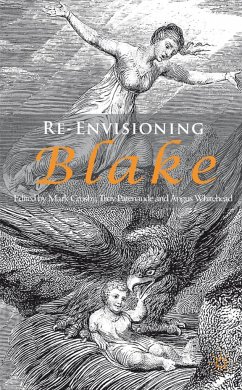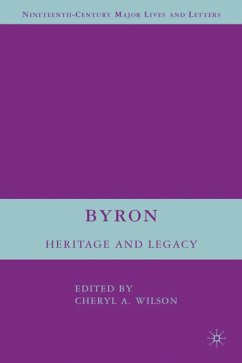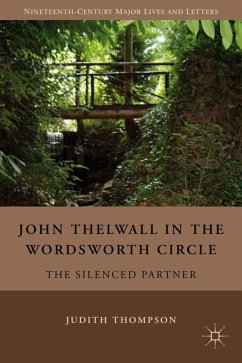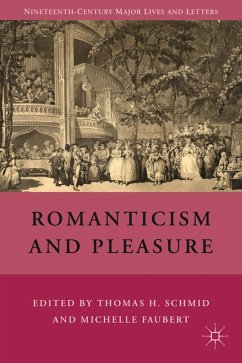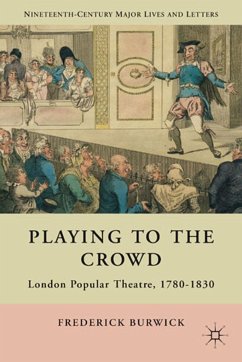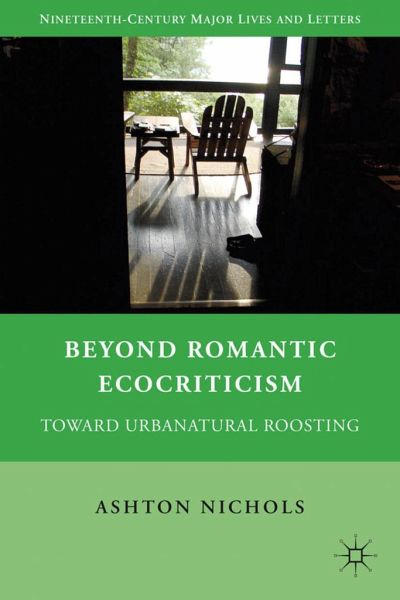
Versandkostenfrei!
Versandfertig in 6-10 Tagen

PAYBACK Punkte
19 °P sammeln!





Nichols chronicles the Enlightenment view of 'Nature' as static and separate from humans as it moved towards the Romantic 'nature' characterized by dynamic links among all living things. Engaging Romantic and Victorian thinkers, as well as contemporary scholarship, he draws new conclusions about 21st-century ideas of nature.
B. ASHTON NICHOLS is John J. Curley '60 and Ann Conser Curley '63 Faculty Chair in the Liberal Arts and Professor of English Language and Literature at Dickinson College, USA. He is the author of The Revolutionary 'I': Wordsworth and the Politics of Self-Presentation and The Poetics of Epiphany: Nineteenth-Century Origins of the Modern Literary Moment.
Produktdetails
- Nineteenth-Century Major Lives and Letters
- Verlag: Palgrave Macmillan / Palgrave Macmillan US / Springer Palgrave Macmillan
- Artikelnr. des Verlages: 978-1-137-03399-4
- 2011 edition
- Seitenzahl: 230
- Erscheinungstermin: 24. Juli 2012
- Englisch
- Abmessung: 213mm x 140mm x 18mm
- Gewicht: 302g
- ISBN-13: 9781137033994
- ISBN-10: 1137033991
- Artikelnr.: 35430455
Herstellerkennzeichnung
Libri GmbH
Europaallee 1
36244 Bad Hersfeld
gpsr@libri.de
"With this lyrical, insightful book on urbanature (emphasis on the first syllable), Nichols (Dickinson College) makes a significant contribution to the evolving field of eco-criticism and to the prestigious "Nineteenth-Century Major Lives and Letters" series. Nichols inches toward the interdisciplinary by including architecture, natural history, cultural studies, and evolutionary biology within the purview of literary studies . . . Combining literary, anecdotal, and philosophical perspectives, this invaluable book crossbreeds political, spiritual, scientific, and aesthetic elements within the outworn dichotomy of town and country. Summing Up: Essential." - Choice
"At the heart of the book is a vision, at once intellectual,
"At the heart of the book is a vision, at once intellectual,
Mehr anzeigen
spiritual, and pragmatic, of humans as fundamentally part of the natural world, together with a belief that to establish an "ecoculture" we must embrace that belonging. Beyond Romantic Ecocriticism s holistic vision of ecology as a single integrated system, combining the human and non-human alike, shares much in this respect with Timothy Morton s recent writings, Ecology Without Nature and The Ecological Thought. Nichols focuses, however, not so much on the problem of 'nature' as a category as on human kinship within nature: a kinship which must ultimately define our meanings, our values, and our forms of life. To 'roost' in this sense becomes a keyword for living sustainably in and from environment, without damaging that environment. Beyond Romantic Ecocriticism is in the end a deeply hopeful call, that if can let go of the false distinction between nature and culture and embrace our urbanatural roosting, we can learn to live ecologically while finding all the 'soul' we need in the material and biological world that constitutes us." - ISLE
"There is no question that Nichols has written a wondrous book, innovative in its merging of genres, richly veined with intellectual history, literary criticism, and a passionate vision for the future of environmentalism." - NBOL-19
"Nichols offers a subtle, but significant new way of understanding many of the central debates in the nineteenth century, most notably around evolution, species, and extinction, and how they relate to pressing global concerns. It is this sense of intextricability between the human and the natural that Nichols tries to capture in the word 'urbanature.;" - Nineteenth-Century Gender Studies
"Both critically and artfully, Nichols explores how our conceptions of nature have derived from Enlightenment-era ideas (humans and nature are separate) and Romantic poetry (humans and nature are connected). Relying heavily on poetic examples, Nichols also envisions an 'urbanatural' future in which we see ourselves as part of the earth, but without a sense of atavism or regression, and how our environments will shift accordingly." - Sierra
"Nichols offers a provocative new approach to understanding the role of humankind in a post-natural, post-industrial world. Grounded in a perceptive reading of Romantic natural history, this book moves beyond the conventional nature-versus-culture dichotomy toward a more inclusive concept of urbanatural roosting. Along the way, Nichols makes important contributions to our scholarly understanding of British Romantic poetry, American environmentalism, and the history of science." - James C. McKusick, author of Green Writing: Romanticism and Ecology
"Ambitious, learned, experimental, and thoroughly readable, Beyond Romantic Ecocriticism posits 'urbanatural roosting' as a vital twenty-first-century mode of ecological thinking. Perhaps this is what the Chinese might call the 'tian ren he yi' (the harmonious unity of the universe and man) of the new millennium. An inspired (and inspiring) book!" - Scott Slovic, editor of ISLE: Interdisciplinary Studies in Literature and Environment
"Part lyrical memoir, part literary and cultural history, part philosophical meditation, Nichols compelling new book is above all an eloquent, erudite, and impassioned manifesto for a new way of thinking, writing, and living more self-consciously, equitably, and sustainably on this earth. Stressing both the historicity of wilderness and the naturality of the city, Nichols envisages the collaboration of scientific knowledge, urban design and the artistic imagination in the crafting of thriving ecomorphic townscapes as part of a wider practice of sharing and caring for allof earth s diverse, yet all more or less humanized places and spaces." - Kate Rigby, Monash University and author of Topographies of the Sacred: The Poetics of Place in European Romanticism
"There is no question that Nichols has written a wondrous book, innovative in its merging of genres, richly veined with intellectual history, literary criticism, and a passionate vision for the future of environmentalism." - NBOL-19
"Nichols offers a subtle, but significant new way of understanding many of the central debates in the nineteenth century, most notably around evolution, species, and extinction, and how they relate to pressing global concerns. It is this sense of intextricability between the human and the natural that Nichols tries to capture in the word 'urbanature.;" - Nineteenth-Century Gender Studies
"Both critically and artfully, Nichols explores how our conceptions of nature have derived from Enlightenment-era ideas (humans and nature are separate) and Romantic poetry (humans and nature are connected). Relying heavily on poetic examples, Nichols also envisions an 'urbanatural' future in which we see ourselves as part of the earth, but without a sense of atavism or regression, and how our environments will shift accordingly." - Sierra
"Nichols offers a provocative new approach to understanding the role of humankind in a post-natural, post-industrial world. Grounded in a perceptive reading of Romantic natural history, this book moves beyond the conventional nature-versus-culture dichotomy toward a more inclusive concept of urbanatural roosting. Along the way, Nichols makes important contributions to our scholarly understanding of British Romantic poetry, American environmentalism, and the history of science." - James C. McKusick, author of Green Writing: Romanticism and Ecology
"Ambitious, learned, experimental, and thoroughly readable, Beyond Romantic Ecocriticism posits 'urbanatural roosting' as a vital twenty-first-century mode of ecological thinking. Perhaps this is what the Chinese might call the 'tian ren he yi' (the harmonious unity of the universe and man) of the new millennium. An inspired (and inspiring) book!" - Scott Slovic, editor of ISLE: Interdisciplinary Studies in Literature and Environment
"Part lyrical memoir, part literary and cultural history, part philosophical meditation, Nichols compelling new book is above all an eloquent, erudite, and impassioned manifesto for a new way of thinking, writing, and living more self-consciously, equitably, and sustainably on this earth. Stressing both the historicity of wilderness and the naturality of the city, Nichols envisages the collaboration of scientific knowledge, urban design and the artistic imagination in the crafting of thriving ecomorphic townscapes as part of a wider practice of sharing and caring for allof earth s diverse, yet all more or less humanized places and spaces." - Kate Rigby, Monash University and author of Topographies of the Sacred: The Poetics of Place in European Romanticism
Schließen
Für dieses Produkt wurde noch keine Bewertung abgegeben. Wir würden uns sehr freuen, wenn du die erste Bewertung schreibst!
Eine Bewertung schreiben
Eine Bewertung schreiben
Andere Kunden interessierten sich für




